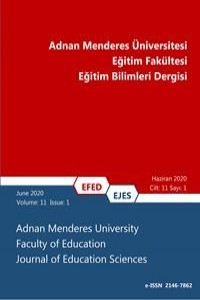Yaşam Temelli Öğrenme Yaklaşımının Öğrencilerin Madde Bağımlılığı Konusundaki Bilgi Düzeylerine Etkisi
Bu araştırmanın amacı, yaşam temelli öğrenme yaklaşımının öğrencilerin “Madde Bağımlılığı” konusundaki bilgi düzeylerine etkisini incelemek olarak belirlenmiştir. Araştırma, Erzincan ilindeki bir devlet lisesinin 9., 10., 11. ve 12. sınıfına devam eden toplam 229 öğrenci ile biyoloji dersi kapsamında yürütülmüştür. Araştırmada öntest/son-test kontrol gruplu yarı deneysel araştırma deseni kullanılmıştır. Veri toplama aracı olarak araştırmacılar tarafından geliştirilen Madde Bağımlılığı Bilgi Testi (MBBT) kullanılmıştır. Ayrıca deney gruplarından gönüllü olarak belirlenen 12 öğrenci ile yapılandırılmış görüşmeler yapılmıştır. Nicel verilerin analizinde, aritmetik ortalama, standart sapma, bağımsız örneklem t testi ve kovaryans analizi (ANCOVA) kullanılmıştır. Nitel verilerden elde edilen bulgular ise betimsel analize tabii tutularak frekans ve yüzde değerlerle sunumu yapılmıştır. Araştırma sonucunda yaşam temelli öğrenme yaklaşımıyla dersi işleyen deney grubunun bilgi düzeyi, kontrol grubundaki öğrencilere göre daha yüksek olmakla birlikte; istatistiksel olarak anlamlı bir farklılık göstermiştir. Görüşme formundan elde edilen bulgular da bu sonucu desteklemiştir
The Effect of Context-Based Learning Approach on Students’ Knowledge Levels about Drug Addiction
The aim of this study is to examine the effect of Context Based Learning approach on students’ knowledge levels about “Drug Addiction”. The research group was consisted of totally 229 students who were attended 9., 10., 11. and 12th grade from a high school in Erzincan. The subject was taught during biology course. The quasy-experimental research design with pretest-posttest control group was employed. The data were collected by Drug Addiction Knowledge Test (SAKT). In addition, totally 12 students from experimental groups were employed with open-ended questions. The data were analyzed through mean values, standard deviation, independent-samples t-test and covariance analysis of variance (ANCOVA). Qualitative data was employed descriptive analysis and the findings were presented in descriptive manner with frequency and percent values. Finally, the findings showed that the knowledge level of experimental group, which course was implemented through Context-Based Learning approach was higher than control group, and there was a statistically significant difference. The findings obtained from interview form supported this result
